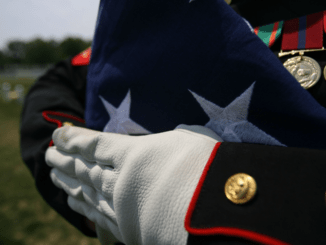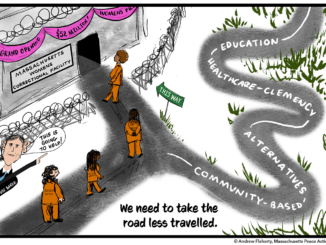
by Craig Simpson
In Northern Minnesota one of the most important struggles around Indigenous Rights and environmental justice has been going on for almost seven years. It involves Anishinaabe tribes and one of the largest fossil fuel companies in the world–Enbridge Corporation. The stakes are high– climate change is rapidly affecting the entire planet, with forest fires in California and Canada, flooding in Germany and New York, increased tropical disturbances, and extreme heat in many areas of the US west.
Under Indigenous women and two spirit leadership, almost 800 people have been arrested along the 350 mile pipeline route across Minnesota. In one of the largest nonviolent direct actions in US history, Indigenous people and their allies have used many creative actions to physically stop the work of the pipeline crews from completing construction. People have locked themselves onto construction equipment, to pianos in an entrance road, to an abandoned boat, a tripod at the entrance of a pumping station, and on trees that were to be cut down. People have hiked from Northern Minnesota all the way to camp in front of the state house in St. Paul, Minnesota. Others have blocked entrances to the so-called “man-camps” where Enbridge workers stay during construction, creating conditions for trafficking and rape of local Indigenous women and girls and two spirit people. Indigenous leaders have filed suits in courts and petitioned the United Nations over treaty violations and lack of environmental impact statements by Enbridge.
I spent three weeks in Northern Minnesota in June. Many people from Massachusetts have gone since February of this year. Many faced arrest, some with misdemeanors and some with felonies. We joined affinity groups and trained in nonviolent direct action for days. We got to know our fellow Water Protectors. We also learned about settler colonization and how it applies to our life personally. We worked in several of the Water Protector camps sleeping in tents and sleeping bags. We faced police threats and violence and jailings. Some of us stood outside jails and courthouses for hours and overnight supporting those inside. Some were shot with rubber bullets or doused with pepper spray. Police have used so-called “pain management” as they tried to force Water Protectors to unlock construction equipment.

Massachusetts Peace Action has supported many of these activities over the months. We supported and helped publicize a sit-in at the Enbridge East coast office in Waltham. In a webinar in early August, three veterans of the Line 3 resistance, Nathan Phillips, Sabine von Mering, and Ericka Williams Rodriguez, talked personally about their reasons for going to Minnesota. We joined with environmental and Indigenous groups and gathered 400 people in late August to rally at the Jamaica Plain home of Gina McCarthy, President Biden’s Climate spokesperson, who in the past had shown support to Indigenous leaders of the Line 3 resistance but has gone silent since she started working for Biden.
MAPA’s Indigenous Solidarity subgroup of the Racial Justice and Decolonization Working Group works to support the Mass. Indigenous Legislative Agenda, including making Indigenous Peoples Day a state-wide hollidary and banning Native mascots in public schools. We are also working to Save the Pine Barrens in Southeast Massachusetts
There is much to do. Join us if you can.
— Craig Simpson convenes MAPA’s Indigenous Solidarity Subgroup



